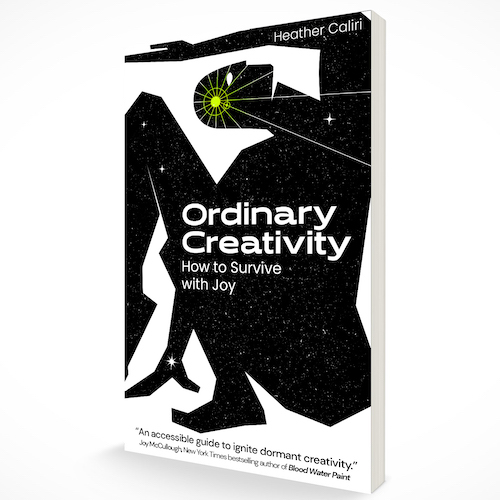
“In the beginning” is a super-important place to be.
You really want to be creative…but it feels like a distant, impossible-to-achieve dream. You struggle to use your time wisely, but when you finally get organized, everything you produce seems terrible. You wish someone would just tell you what to do next, and how. Yet when you get advice, you feel overwhelmed by how hard it is to follow.
Know this: the reason it’s hard is because every creative person feels some level of the bewilderment that plagues you. No matter what, being a beginner is the foundational stage of all creative work. It’s so hard, but, at the risk of stating the obvious, it’s the place everything must start.
Three things you really need to hear:
- Flailing around is part of the process, and there is no way out but through. Do the work you can, and try not to judge it too harshly.
- Struggling with “executive function” (skills like organization and follow through) isn’t laziness—it’s often a sign of neuro-divergence, trauma, or other difficulties. It’s more common than you’d think—and there are practical tools that might help you learn to cope better.
- Start with the smallest chunk of time/energy/commitment possible, and then relentlessly prioritize keeping that tiny promise to yourself. Do the work, and you’ll respect yourself more.
Three Guides
These resources might help you reimagine and reinvent your approach to creative struggles.
The Bullet Journal Method Book and the Bullet Journal Website
When my friend Joy told me I’d like Bullet Journalling, I actually got mad. I’d seen elaborate “BuJo” spreads on Instagram and frankly, they seemed precious, intimidating, and ridiculously time-consuming. But then I learned that BuJo’s creator, Ryder Carrol, developed the system to deal with his severe ADHD, and that the actual techniques Carrol uses are extremely simple. I decided to try it. Now, my journal helps me intentionally cultivate beauty, self-reflection, and peace. For those struggling to organize themselves—especially the neuro-divergent—it is a valuable tool to investigate and make your own.
Divergent Mind: Thriving in a World That Wasn’t Designed for You
This book explores the strengths and difficulties of several kinds of neurological differences—including ADHD, autism, and synesthesia. It especially focuses on the experiences of women. If you have struggled to organize yourself or get told over and over that you should better live up to your “potential”, this book might help you see your struggles differently.
Designing Your Life: How to Build a Well-Lived, Joyful Life
I started this book once and it gave me a stomach ache. I read it a few years later and I found it super-helpful. So it isn’t right for everybody at all times. Still: the second go-around, I found its advice a practical process for really noticing whether I was:
- Living a balanced life, with my career, family life, health and joy all attended to, and
- Noticing how my values affected (or were violated by) the way I lived.
How to Keep House While Drowning
This little book on housekeeping is really about how to give yourself radical permission to re-structure your life so you thrive. If you struggle to just get going on basic tasks, or to create a routine that does not require gritting your teeth to maintain it, this book might help you be far gentler on yourself while also moving towards real joy.
Bird by Bird or Wreck This Journal or Steal Like an Artist or…?
Novices need mentors, but I am not sure who your mentor needs to be. My first was Anne Lamott, whose book Bird by Bird helped me visualize what a healthy, joyful writing life might look like. Or Kerri Smith’s Wreck this Journal helped me tiptoe more into the realm of visual art. But if you’re a musician? An actor? An aspiring puppeteer? Starting a small business?
I don’t have the perfect recommendation.
But do find a mentor to imitate. Who do you admire—or envy? Study their pathway. How do they share their work? What networks are they connected to? Heck, see if you can connect to them personally, and offer to answer emails, scrub their floor, or take them to lunch.
Whatever you do, pay attention to how their advice or example make you feel. Likely not everything that works for them will work for you. Trust yourself and them. Take their advice and tweak it.
What do you think of these results? Do they ring a bell, or feel off-base? Send me an email. I’d love to hear about it.
And if you’re wondering if you’re really allowed to redefine “creativity” to include you, I’d love you to get a copy of my ebook, Ordinary Creativity: Making and Sustaining for Joyful Survival. Order it here!
Photo by Jessica Hearn on Unsplash


